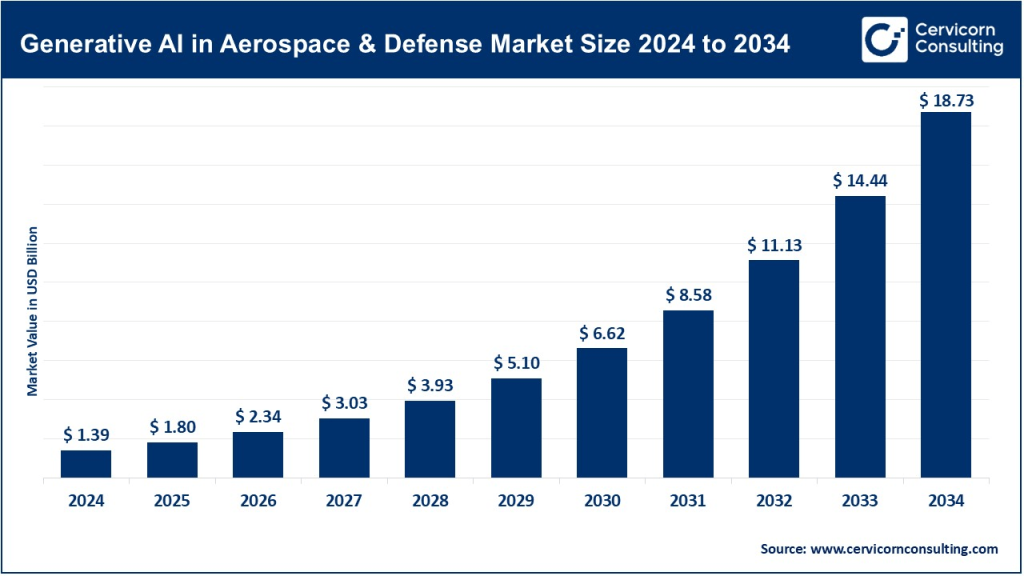Generative AI Aerospace and Defense Market Size and Growth Factors
The global generative AI in aerospace and defense market is experiencing significant growth, projected to expand from USD 1.39 billion in 2024 to USD 18.73 billion by 2034, at a compound annual growth rate (CAGR) of 29.7%. This growth is driven by increasing demand for autonomous systems, heightened cybersecurity threats, the necessity for enhanced security measures, rising military expenditures, and the exponential growth of data requiring analysis.
What is Generative AI in Aerospace and Defense?
Generative Artificial Intelligence (AI) refers to algorithms and models capable of creating new content—be it designs, simulations, or data—based on existing information. In the aerospace and defense sectors, generative AI is revolutionizing operations by enabling rapid prototyping, optimizing designs, enhancing simulations, and improving decision-making processes. For instance, generative design algorithms can swiftly produce multiple design options for aerospace components, considering various constraints and requirements, thereby accelerating the development cycle and reducing costs.
Why is Generative AI Important?
The integration of generative AI in aerospace and defense is pivotal for several reasons:
- Enhanced Design Efficiency: Generative AI accelerates the design process by automatically generating optimized component designs, leading to faster development cycles.
- Improved Maintenance and Operations: AI-driven predictive maintenance models can foresee equipment failures, reducing downtime and maintenance costs.
- Advanced Simulation and Training: Generative AI creates realistic simulation environments for training purposes, enhancing preparedness for various scenarios.
- Strategic Decision Support: AI systems analyze vast datasets to provide actionable insights, aiding in strategic planning and threat assessment.
Get a Free Sample: https://www.cervicornconsulting.com/sample/2639
Top Companies in the Generative AI Aerospace and Defense Market
Several leading companies are at the forefront of integrating generative AI into aerospace and defense:
Lockheed Martin Corporation
- Specialization: Advanced aerospace and defense technologies.
- Key Focus Areas: AI integration in defense systems, including the F-35 program.
- Notable Features: Established a subsidiary to assist defense companies in adopting AI technologies.
- 2024 Revenue: $71.0 billion.
- Global Presence: Operations across North America, Europe, Asia, and the Middle East.
Northrop Grumman Corporation
- Specialization: Aerospace systems, defense technology, and cybersecurity.
- Key Focus Areas: AI-driven autonomous systems and cybersecurity solutions.
- Notable Features: Significant investment in AI research and development.
- 2024 Revenue: $41 billion.
- Global Presence: Strong presence in the U.S., Europe, and the Asia-Pacific region.
Raytheon Technologies Corporation (RTX)
- Specialization: Aerospace and defense systems, including avionics and missile systems.
- Key Focus Areas: Integration of AI in missile defense and avionics.
- Notable Features: Utilization of AI for predictive maintenance and system optimization.
- 2024 Revenue: $80.7 billion.
- Global Presence: Extensive operations in North America, Europe, and Asia.
BAE Systems plc
- Specialization: Defense, security, and aerospace systems.
- Key Focus Areas: AI applications in electronic warfare and autonomous platforms.
- Notable Features: Development of AI-driven defense solutions.
- 2024 Revenue: £28.3 billion.
- Global Presence: Operations spanning the UK, U.S., Australia, and the Middle East.
General Dynamics Information Technology Inc.
- Specialization: IT services and solutions for defense and intelligence sectors.
- Key Focus Areas: AI integration in defense IT infrastructure and cybersecurity.
- Notable Features: Strategic collaboration with AWS to enhance AI capabilities.
- 2024 Revenue: $47.7 billion.
- Global Presence: Serving clients across North America, Europe, and Asia.
Leading Trends and Their Impact
Several key trends are shaping the integration of generative AI in aerospace and defense:
- Autonomous Systems: AI is central to developing autonomous drones and vehicles, enhancing surveillance and reconnaissance capabilities.
- Cybersecurity: Generative AI aids in identifying and mitigating cyber threats, crucial for protecting defense infrastructure.
- Predictive Maintenance: AI models predict equipment failures, allowing for proactive maintenance and reducing operational downtime.
- Advanced Simulation: Generative AI creates complex simulation environments for training, improving readiness for various scenarios.
Successful Examples of Generative AI in Aerospace and Defense
Several organizations have successfully implemented generative AI:
- Airbus: Utilizes generative AI to enhance manufacturing processes and customer service operations.
- GE Aerospace: Employs AI to increase readiness and reduce life-cycle costs for defense customers.
- Saab: Emphasizes the importance of AI and software skills in the defense industry, reflecting the sector’s shift towards software-driven systems.
Global Regional Analysis: Government Initiatives and Policies
Governments worldwide are recognizing the strategic importance of generative AI in defense:
- United States: The Department of Defense has launched accelerator programs to foster AI innovation in defense startups.
- United Kingdom: The UK defense review highlights the transformative impact of AI and emerging technologies on modern warfare.
- India: Investments in AI research and development are being made to enhance defense capabilities and promote indigenous innovation.
- European Union: Collaborative efforts are underway to integrate AI into defense strategies, ensuring technological competitiveness.
To Get Detailed Overview, Contact Us: https://www.cervicornconsulting.com/contact-us
Read Report: Aircraft Market Size, Share, Trends & Leading Companies 2024-2034

